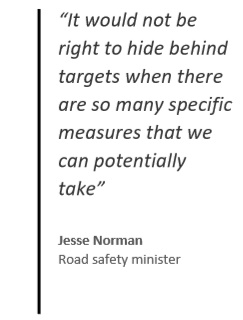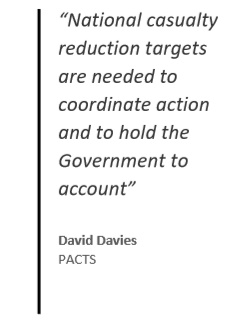
Road safety minister Jesse Norman has confirmed that the Government is not minded to re-introduce road safety targets.
Speaking during the House of Commons debate on 5 November, Mr Norman said there was no correlation between countries with road safety targets and good road safety records.
He added that rather than targets, the focus should be on specific measures that could be implemented to reduce the number of casualties – such as protecting older and vulnerable road users.
 Mr Norman said: “The issue of targets is constantly raised with the Government, and this evening has been no exception.
Mr Norman said: “The issue of targets is constantly raised with the Government, and this evening has been no exception.
“I repeat that some countries with great safety records have targets, and some do not.
“There is no necessary correlation, and it would not be right to hide behind targets when there are so many specific measures that we can potentially take.”
First introduced in 1987, road safety targets were axed in 2010 – despite being seen by many as having played an important role in helping to reduce the number of deaths and serious injuries on UK roads.
However, with road casualties flatlining since then, stakeholders have repeatedly called for their reintroduction – including PACTS, whose executive director David Davies outlined the case during a one-day conference in London last week.
David Davies said: “PACTS firmly believes that national casualty reduction targets are needed to coordinate action and to hold the Government to account. There is no contradiction between having targets and focusing on specific measures.
“Indeed, targets would help to ensure that the specific measures were selected on the basis of effectiveness and targeted at substantial casualty numbers, rather than measures which might simply be easy or popular.
 “If targets are unhelpful, why does the Government have targets in other policy areas and set them for Highways England?
“If targets are unhelpful, why does the Government have targets in other policy areas and set them for Highways England?
“Ministers frequently say that ‘one death is one too many’- yet we have had seven years of stagnation in road death figures. A firm reiteration of the Conservative 2015 manifesto commitment to reduce deaths and injuries every year would be a good start.”
Matt Rodda, Labour’s shadow minister for local transport, also supports the re-introduction of road safety targets.
During the debate, Mr Rodda said: “The Government scrapped road targets that successfully reduced the number of people killed or seriously injured by a third under the last Labour Government.
“The Government tell the shadow transport team that targets do not achieve anything. We disagree. The opposition believe that targets focus awareness and attention and, ultimately, help hold the Government to account.
“All the evidence points to targets being a proven facilitator of achieving road safety improvements, and yet there are no targets to assess progress.”
Attempting to reduce a complex subject into the binary choice you suggested is erroneous, overly simplistic and adds little to the knowledge base.
This is a comments section, not a debating chamber, I’ve had my 3, so no more posts on this particular subject from me. Each of us need to have sensible self imposed limits to the number of comments we make, otherwise restrictions may well need to be introduced.
Pat, Wales
+13
In that case Pat, we will always have drivers who have better ability and are more careful than others and which makes national road safety targets irrelevant. Road casualties will therefore always be at a level set by a mix of those who ‘can and will’ and those who ‘can’t or won’t’ – please reassure me that as a road safety officer, you’re not part of the latter group.
Hugh Jones
--10
A lifetime of driving without incident is a wonderful achievement but no Hugh, not ultimate responsibility .
Drivers in all sizes of tin boxes on wheels should take proportionate responsibility. It is frequently sadly lacking and pedestrians etc inevitably come off worst in collisions but I will never accept the principle of ultimate responsibility as you propose it. It is now and should remain proportionate.
Pat, Wales
+11
Pat: The point I was trying to make is that whilst the slower-moving road users you mentioned do also have responsibility for their actions, it is the faster, bigger and heavier moving vehicles that will harm them – not the other way around – hence those in charge of the latter must take ultimate responsibility. As I said before, many manage a lifetime of driving without incident, despite the careless actions of others, so it’s not impossible and would be a personal ‘road safety target’ to be proud of.
Hugh Jones
+1
Astonishing that based on the disagrees, the way I read it, some people actually think that motorists do not have any responsibility for their actions.
Hugh Jones
--1
Hugh. I have to say that I agree and that to many drivers road safety does not appear to be a priority or consideration at all, That is when it comes to their driving but apparently not to others that share the road with them and who are i to their mind the dangerous ones. Never criticise any mans driving ability unless you want a fight on your hands.
If some 40% of motorists drive far too close to the vehicle in front and about 80% or more don’t even slow down on wet roads let alone in bad wet weather conditions then where are we with regards to road safety, individual targets and responsibility…. Nowhere, that’s where.
So I agree with you that in the main its the motorists that we need to get to and change their mindset to a safer one. Perhaps it’s the way we train and advise our trainees with bad habits that may stay with them. If the initial training is not up to scratch then what chance have they to improve. Also we need to address the drip drip drip of faulty and dangerous motoring habits that have apparently become the norm. Possibly because there is little out there to influence any change in them.
R.Craven
+5
Those “behind the wheel” may carry a large responsibility and drivers of PSVs and HGVs and other heavy vehicles the greatest responsibility. However pedestrians, cyclists, mobility scooter users etc also have a responsibility which they are failing to fulfil if they carelessly wander out into the road. The highway code rules 1 to 35 spell out what is expected of pedestrians.
Pat, Wales
+6
Any right-thinking motorist will have adopted their own road safety target – nil – and drive/ride accordingly – many find that relatively easy to achieve. The authorities do what they can, but essentially it is those behind the wheel who carry the responsibility.
Hugh Jones
+7